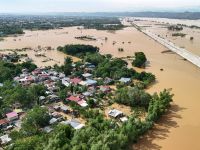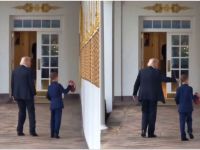Preliminary talks on setting up a new Afghan government began on a note of urgency in Germany on Monday, ahead of a UN-sponsored conference seen as a historic opportunity to end decades of bloodshed in Afghanistan.
"We need to get a transitional authority in the country as soon as possible. We can't spend a lot of time on this," UN spokesman Ahmad Fawzi told a press conference at the talks venue near Bonn.
"The people of Afghanistan have been disappointed in the past, we certainly hope they will not be disappointed again," he said on the eve of the official launch of the talks.
Outlining the agenda of the inter-Afghan talks, Fawzi said delegates would first tackle the setting up of a "transitional administration in Afghanistan", an interim government that would pave the way for a Loya Jirga, or "grand assembly" of tribal chieftains, that would in turn convene to hammer out a new constitution.
The Afghan delegates, from four camps including the now-dominant Northern Alliance and the Rome-based former king Mohammed Zahir Shah, would then move on to the thorny point of security in post-Taliban Afghanistan.
"The question of security will be the second item and will be of paramount importance," said the spokesman for UN special envoy Lakhdar Brahimi, the Algerian diplomat who convened the talks.
"The most viable option is a multinational force with a UN mandate, that is to say a mandate from the Security Council," Fawzi said, adding that preliminary discussions with delegates already here were underway.
"The invitation to participate (in a multinational force) will come when the mandate of the Security Council is adopted ... if the Security Council decides to do so," he added.
But he ruled out the prospect of sending a traditional "blue helmet" peacekeeping mission to the country, as well as the option of an all-Afghan security force.
Fawzi also stressed "the UN has made no conditions" to the delegates, but he said bluntly: "They know what we have to offer, what the UN and the international community has to offer, and the choice is theirs."
The talks officially begin on Tuesday, when delegates are to be secluded in the Petersberg government residence nestled in the mountains about 15 kilometers (nine miles) from Bonn and away from the pressures of foreign powers keen to see their favorites win a stake in a future government.
"We are trying to create an atmosphere conducive to decision making," Fawzi said.
The largest delegation is from the Northern Alliance, which goes into the negotiations in a strong position having sprung back from near-oblivion to take control of most of the country including the capital Kabul on the back of intensive US air strikes on the Taliban.
The Alliance is sending an 11-strong team, a delicate and colourful mix of ethnic Tajiks, Hazaras and Uzbeks that dominate its ranks. But three officials from Afghanistan's ethnic Pashtun majority are also included.
The 87-year-old former king, ousted in 1973 but still regarded as a potentially crucial rallying point for Pashtuns that dominate the south of the country, once the Taliban's heartland, is sending a nine-member delegation.
Two other camps will also attend: members of the so-called Cyprus process made up of a mix of exiled intellectuals and representatives of former warlords, and a team loyal to Pir Syed Ahmad Gailani, a respected ethnic Pashtun backed by Pakistan.
No members of the hardline Taliban, once in charge of 90 percent of the country but now battling to defend their last remaining stronghold in Kandahar, will be attending.
Fawzi said he was satified with the Afghan line-up: "We are lucky we got four groups together. This is the best we could do.
"This is just the first step on a very long road, and it is going to take a little time to have a fully representative group," he told reporters.
As Fawzi spoke of the "heavy burden on the shoulders of the political leaders of Afghanistan", a spokesman for the former former king hinted at the kind of pressure the rival camps are under.
"They should not come out as traitors to history, it is a matter of giving and taking concessions without which the meeting will not be successful," Yousouf Nooristani told AFP.
But the talks will be complex: any government will have to satisfy the ambitions of Afghanistan's patchwork of ethnic groups and powerful warlords, as well as key rival players in the conflict such as Pakistan, Russia, Uzbekistan, Iran and the United States.
No time limit has been set, but Fawzi emphasized that "time is of the essence.” -- BONN (AFP)
© 2001 Al Bawaba (www.albawaba.com)







